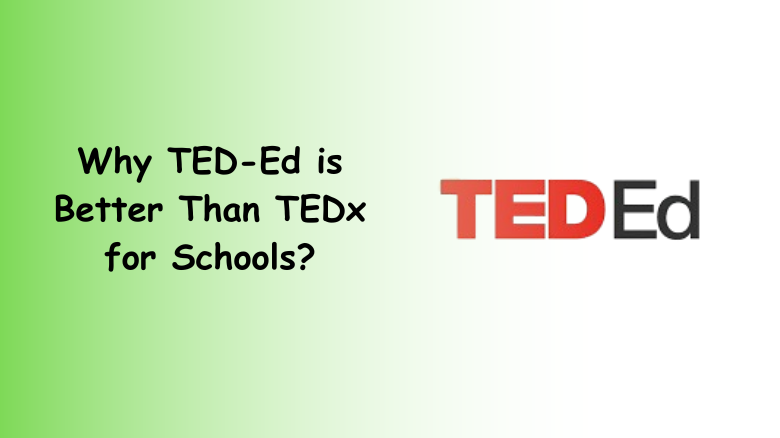Picture a classroom full of enthusiastic young people, each with a note card bearing ideas scrawled on it, both brave and anxious. One pupil takes a step forward, looks down, and inhales before starting. She has been working on, studying, and practising this idea for weeks, and now she is ready to share it with the world. As she speaks, her voice becomes more steady after first trembling. Captivated, her peers nod in agreement. When she finishes, the room bursts into cheers, not only for the speech but also for the bravery with which it was delivered.
Our school, Epistemo Vikas Leadership School, is the nurturing hub of a TED-Ed Club—a safe space where kids learn to be heard and speak confidently. Unlike TEDx events, which often cater to a wider audience, our TED-Ed Club supports and nurtures growth.
Schools have been using initiatives like TED-Ed and TEDx in recent years to encourage students to develop their presentations and critical thinking. Although both programs are under the well-known TED name, TED-Ed is a superior option for educational institutions because of its unique features, which are created especially for classroom settings. These characteristics include its resources for young learners, age-appropriate organization, and emphasis on student growth.
1.Learning and Personal Development Focused on Students
TED-Ed Clubs help students prepare and present a TED-style talk. The heart of the TED-Ed approach is engaging young brains in a secure, encouraging setting. Students can work together, pursue their interests, and hone their public speaking abilities without feeling rushed, which promotes both skill and personal development.
In contrast, community-based TEDx events prioritize well-known speakers and bigger productions, frequently targeting an adult or mixed-age audience. Although TEDx can motivate students to watch, it doesn't emphasize the acquisition of skills or the process of growth required to enable students to make their presentations. However, TED-Ed strongly emphasizes student-led learning, encouraging self-assurance and personal development that will benefit students even after they leave the classroom.
2.Age-Related Advice and Materials
With simple and exciting exercises, the TED-Ed Club materials handhold students through every step of creating a talk, from brainstorming to the final presentation. Because these exercises are designed with students in mind, the material is pertinent and related to their developmental stage.
Although powerful, TEDx does not offer the same degree of student-specific instruction. Younger audiences may find TEDx's emphasis on formal events featuring expert speakers too complex or intimidating. In contrast, TED-Ed provides organized materials to support learning objectives and gradually develop their skills.
3.Building 21st Century Competencies in a Safe Environment
TED-Ed Clubs provide a safe environment for students to practice and make mistakes without fear of criticism.
TEDx events emphasize on performance than skill development. The focus of TEDx is the exchange of finished ideas and not the learning process. However, TED-Ed Clubs allow students to present their ideas at their speed, learn to give and take feedback, and thus develop individuals. This method helps students develop the critical 21st-century abilities they need in a rapidly changing world, such as communication, critical thinking, and teamwork, skills which will continue to benefit them long after they leave the classroom.
4.All Students Can Access and Use It
TED-Ed Clubs are designed to be inclusive. Every student who is a student can join and gain from the collaboration, regardless of their background in public speaking or subject-matter expertise. TED-Ed Clubs foster an inclusive atmosphere where everyone's viewpoints are recognized and valued by enticing all students to express their ideas. A fundamental component of the TED-Ed methodology, this inclusivity adds a supportive atmosphere for students' growth.
On the contrary, TEDx usually has a stricter screening process for speakers and is sometimes limited to those with advanced speaking skills or specialized knowledge. TEDx is a fantastic event, but not every child has the same opportunity to join and practice.
TEDx events are usually more critical, one-time performances that require more preparation and resources. If they can have a big influence on the community, it could be more challenging to incorporate them into a school's continuous learning objectives.
5.A School Showcase Honoring Student Voices
Students deliver their speeches to peers, family members, and teachers during the Showcase event, which is the culmination of TED-Ed Clubs. The TED-Ed Showcase is an excellent approach to celebrating learning in an academic atmosphere since it emphasises acknowledging each student's achievement, unlike TEDx events, which may be scary and competitive.
In conclusion, TED-Ed Clubs provide a student-centric, easily accessible, and educationally aligned platform that is more supportive of personal growth than TEDx. TED-Ed helps students strengthen their critical thinking, public speaking, and teamwork skills by focusing on each student's journey from ideation to presentation. This gives them the courage to voice their opinions in a world that needs a range of perspectives. Thus, TED-Ed is a better choice for educational institutions.


